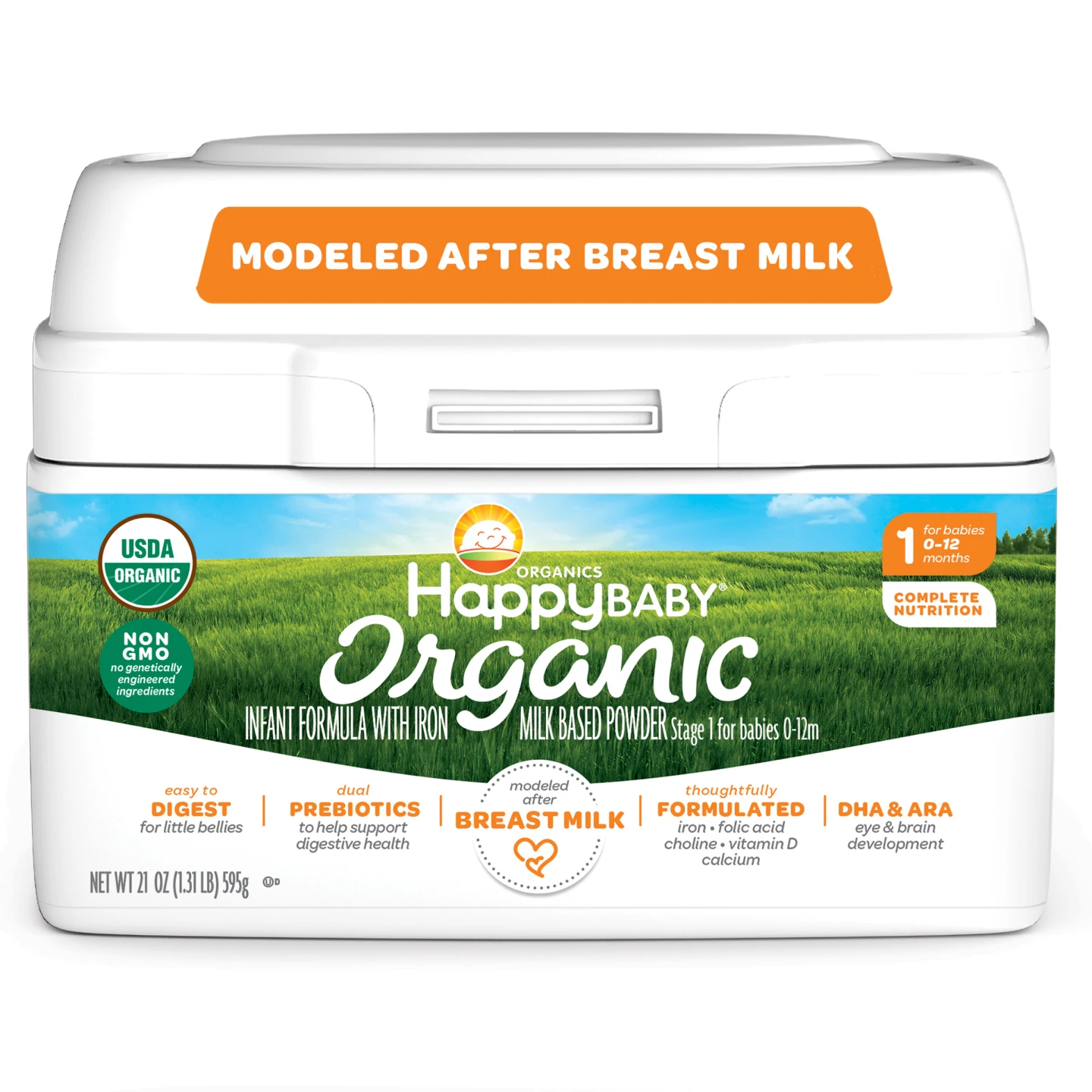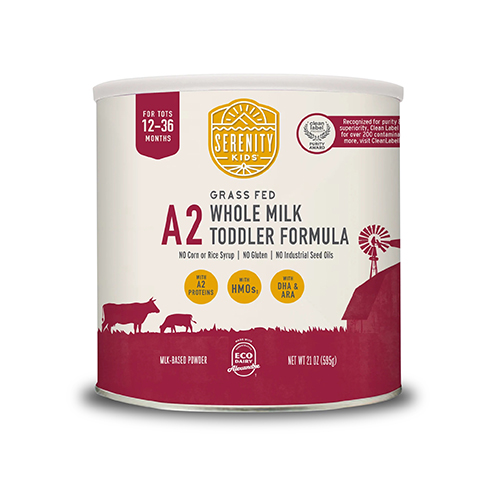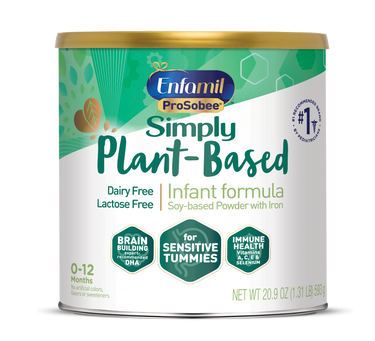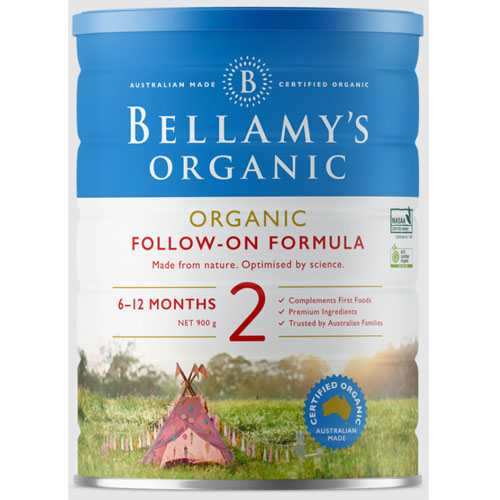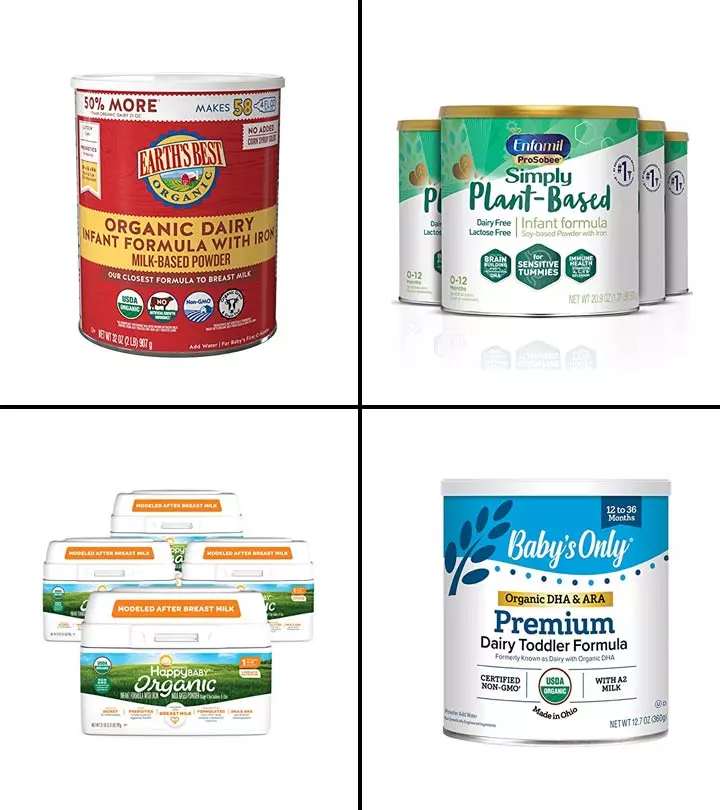
Image: MomJunction Design Team
Finding the right formula for your child may be challenging. So, we have created a list of the best organic baby formulas to help you choose the right one. As your child might have a delicate stomach and can get gassy easily, it is important to choose an easy-to-digest and gentle formula. It should also be rich in nutrients and free of harmful chemicals and additives that might harm your child. However, it is best to consult a pediatrician before choosing a formula.
Top Picks
Benefits Of Organic Baby Formula
Here are some benefits of using organic baby formula.
- Contain no artificial or synthetic ingredients and chemicals
- Rich in nutrients
- Beneficial for mental growth
- Free of genetically modified organisms (GMOs)
Types Of Organic Formulas
Following are the different organic formulas available for babies.
- Cow milk formula: The most common base for organic formulas is cow’s milk. To produce a fatty acid profile similar to breast milk, cow milk formulas are made with skimmed milk, supplemented with a blend of organic vegetable oils. It contains a naturally occurring milk fat globule membrane, a key component of breast milk, related to a newborn’s cognitive development.
- Goat milk formula: Organic goat milk baby formula contains the same nutrients as cow milk formulas but is more suitable for babies who have difficulty digesting cow milk or exhibit signs of milk protein intolerance, such as eczema or skin rashes.
- Soy-based formula: Suitable for lactose intolerant children and those with severe dairy allergies or other medical reasons.
- Hypoallergenic formula: Hypoallergenic baby formulas benefit children with moderate intolerance to cow milk protein, where the intact milk proteins are transformed into broken-down proteins of manageable amounts.
7 Best Organic Baby Formulas In 2025 And A Buying Guide
1. Best For Essential Vitamins:Happy Baby Organics Infant Formula
Happy Baby’s four-pack organic infant formula is created with expert-approved organic lactose, the main carbohydrate in breast milk, and other carefully chosen quality components. This formula is tailored to offer key vitamins and minerals naturally present in breast milk, with two prebiotics and fibers that promote the child’s healthy digestive system. This YouTuber’s review showcasing a tester’s experience can help you make an informed decision.
Pros
- USDA Certified Organic
- Non-toxic, high-quality ingredients
- Non-GMO
- No corn syrup solids
- Contains calcium pantothenate
Cons
- Might have a slight metallic smell
"This formula is the first one I got for my baby when transitioning him from breastmilk, and I have not looked back since then. It's always been easy on his stomach and reduced spit-ups. It needs a good mix to not create foam, but that's a minor hassle compared to its benefits."
2. Best For Immunity:Earth’s Best Organic Dairy Infant Powder Formula
The organic baby formula with iron by Earth’s Best is quite similar to breast milk. It provides DHA and ARA, two fatty acids in breast milk that promote brain and eye development, and iron for red blood cell growth. The hydrolyzed baby formula also has lutein, which can improve vision, and prebiotic fiber for immunity. This organic option uses simple proteins that are gentle on the stomach, including partially hydrolyzed whey. You can also check this YouTube video for a complete idea about the product.
Pros
- Does not contain corn syrup solids
- Meets FDA requirements
- Non-GMO
- Contains calcium pantothenate
- USDA-certified organic
Cons
- Might cause constipation
"Switching to this formula was easy for my baby as it resembles the consistency of breast milk. She has also been able to digest it without experiencing any stomach discomfort, which is a big plus. Also, the lack of artificial agents is much appreciated."
 Do remember
Do remember3. Best For Easy-To-Digest:Earth’s Best Organic Gentle Infant Powder Formula
Earth’s best organic infant formula is formulated for the baby’s initial twelve months as they may have a sensitive stomach or tolerance issues. It contains easy-to-digest proteins, including partially hydrolyzed whey. The DHA- and omega-3 enriched baby formula helps promote eye and brain development. It is made from the milk of grass- and grain-fed cows.
Pros
- FDA-approved
- Non-GMO
- Contains calcium pantothenate
- No added corn syrup solids
- Certified USDA organic
Cons
- May cause gas
Happy Baby Organics Infant Formula Best For Essential Vitamins: | Earth's Best Organic Dairy Infant Powder Formula Best For Immunity: | Earth's Best Organic Gentle Infant Powder Formula Best For Easy-To-Digest: | |
|---|---|---|---|
| Weight | 7.2 Pounds | - | 21 Ounces |
| Dimensions | 4.5 x 6.67 x 5.31 inches | 5.2 x 5.2 x 6.8 inches | 5.1 x 5.1 x 4.79 inches |
| Weight | - | 2 Pounds | - |
| Rating | |||
| Reviews | 827 | 2,754 | 198 |
| Price | $119.96 | $43.4 | $32.49 |
4. Best Organic Whey Protein:Baby’s Only Organic Premium Dairy Toddler Formula
Made from A2 milk, the DHA and ARA in Baby’s Only toddler formula are extracted naturally from organic egg yolks. This DHA in the phospholipid form is readily available than DHA in the triglyceride form. The formula is dad-and-mom-approved, its organic whey protein is easier to digest, and the carbohydrate component is 100% lactose.
Pros
- Non-GMO
- Does not contain corn syrup
- No hormones and antibiotics
- Gluten-free organic option
Cons
- May be foamy
"I opted for this formula due to its organic build, and I am glad it has not caused any digestive issues. While its price is affordable and even mixes easily, I wish it came in larger quantities to eliminate the need to buy it repeatedly."
5. Best Hexane-Free:Serenity Kids A2 Whole Milk Toddler Formula
Serenity Kids’ nutrient-rich, safety-tested, and easy-to-digest formula is produced with a unique blend of A2 protein, high-quality fats, complex carbohydrates, prebiotics, key vitamins, and minerals. This non-GMO baby formula with calcium pantothenate is a trusted choice for children aged 12 months and above. The hexane-free extracted DHA and ARA are essential for brain and eye development. If you want to know more about the results, check out this review showcasing a tester’s experience.
Pros
- Gluten-free
- Non-GMO
- Does not contain corn syrup
- No added hormones or antibiotics
Cons
- May have an unpleasant taste and smell
6. Best For Infants:Bellamy’s Organic Step 2 Follow-On Formula
Suitable for infants ranging from six to 12 months old, the expert-approved Step 2 formula by Bellamy’s is formulated with key ingredients that supplement the introduction of solid food. This scientific DHA-enriched baby formula consists of minerals, vitamins, nutrients, and prebiotics that help with the growth of your little one, making it a trusted choice. It also enhances digestion, immunity, and cognitive function.
Pros
- Australian dual-certified organic
- Comes in a sealable container
- FDA-approved
- Free from harmful chemicals
- Does not have artificial flavors,
- Preservative- and fragrance-free
Cons
- May contain cow milk
- Not suitable for those with soy allergies
7. Best For Brain Development:Enfamil ProSobee Simply Plant-based Infant Formula
This infant formula powder, by the trusted brand Enfamil, is a dairy- and lactose-free baby formula. It can help alleviate fussiness, gas, colic, and other symptoms associated with milk-based formulas. This gentle soy-based baby formula with iron is expert-approved. It can be trusted by moms and dads as it has the same levels of brain-nourishing DHA as Enfamil’s regular formula, which helps to promote cognitive brain development.
Pros
- No added colors or flavors
- Pediatrician-recommended
- No synthetic ingredients
- No artificial sweeteners
- High-quality ingredients
- Includes vitamins A, C, and E
Cons
- May have a strong odor
 Quick fact
Quick factHow To Choose The Right Organic Baby Formula?
Here are a few tips you can follow in choosing the best organic baby formula. However, check with your baby’s health physician before buying one.
- Formula stage: Some organic products may provide two stages, while others may provide up to four. Prebiotics and probiotics, for example, are commonly found in stage one formulas and are made to develop the child’s healthy immune system. Stage four formulations have more vitamin D and iron, which help with cognitive development and provide essential nutrition throughout the baby’s growth phase. Consider your baby’s requirements and choose accordingly.
- Ingredients: Avoid high sugar formulas, but be aware of sucrose and lactose. Ensure the formula is certified organic, does not have corn or rice syrup, and is free of harmful additives and chemicals. It is best to check out the ingredients list to ensure the absence of components that your baby may be allergic to.
- Nutrients: Choose organic and clinically proven formulations that contain essential nutrients, including fatty acids, L-Carnitine, and amino acids- tyrosine and phenylalanine. It should include beneficial probiotics, which can help reduce stomach sensitivities and ensure your baby is getting enough beneficial bacteria.
Frequently Asked Questions
1. What type of water should I use for baby formula?
To make liquid-concentrate or powdered baby formula, you can use any clean water, tap or bottled. Ensure the water is lukewarm and not hot.
2. Is organic formula better than regular formula?
A certified organic formula is safe to consume. Unlike regular formula, organic formula is formulated free of GMO ingredients, growth hormones, and pesticide residue. So your baby is less likely to be exposed to toxins and other harmful chemical substances.
3. Is it okay to feed a baby both breast and formula milk?
It is completely normal to feed a baby both breast and formula milk. You can combine feeding if your baby is not receiving the right amount of milk or if you plan to return to work. However, combining feed may decrease the milk supply.
4. Which milk is best for a 0 to 6 months baby?
Breastfeeding your baby for the first six months is ideal. It helps provide all the nutrients in breast milk, and breast milk helps your little one combat infections (1).
5. Is organic baby formula necessary?
Organic formulas for babies ensures that your baby is less exposed to toxins and harmful chemicals.
6. How long is the formula good for?
Cathy Moore, a certified newborn care specialist, says, “If you’ve prepared formula at room temperature, it is recommended that you use it within an hour. And if the formula has been sitting out for longer than an hour, you should discard it.” If the formula milk is untouched, you can store it in a refrigerator and use it within 24 hours. Discard the leftover milk if your baby leaves some milk in the bottle after feeding (2).
Why Trust MomJunction?
We have prepared this list of the best organic baby formulas for children who have a delicate stomach and need to be fed something easy to digest. With their gentle and all-natural ingredients, these formulas do not contain any harmful chemicals and additives, so you can feed your little one without worry. Each product has been thoroughly researched on the basis of several important aspects to ensure it meets the quality standards to help you pick a suitable one for your baby.
With the best organic baby formulas, you can be sure that your child receives the nutritional benefits they require to grow and be healthy. Organic formulas are of various types, including cow-milk, goat-milk, soya-based, and HiPP HA hypoallergenic formula, and you can choose one that is best for your baby’s needs. Regardless of which formula you choose, evaluate your child’s present formula stage to ensure you’re giving them the necessary nutrients. Also, avoid high-sugar formulas and instead choose pediatrician-recommended ones that are rich in nutrients such as fatty acids and amino acids.
Infographic: What Does Organic Cow Milk Baby Formula Mean?
Organic cow milk baby formula is a nourishing and natural type of formula for infants. Made from carefully sourced organic ingredients, it provides essential nutrients while avoiding artificial additives. Gain a better understanding of how these formulas differ from conventional cow milk formulas in the infographic below, highlighting organic dairy’s key characteristics.

Illustration: Momjunction Design Team
References
- Breastfeeding vs. Formula Feeding
https://kidshealth.org/en/parents/breast-bottle-feeding.html - Infant Formula Preparation and Storage
https://www.cdc.gov/infant-toddler-nutrition/formula-feeding/preparation-and-storage.html - Amount and Schedule of Baby Formula Feedings.
https://www.healthychildren.org/English/ages-stages/baby/formula-feeding/Pages/amount-and-schedule-of-formula-feedings.aspx
Community Experiences
Join the conversation and become a part of our nurturing community! Share your stories, experiences, and insights to connect with fellow parents.
Read full bio of Catherine Moore
Read full bio of Lidiya Kodathala
Read full bio of Poulami Nag
Read full bio of Swati Patwal






